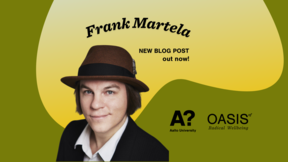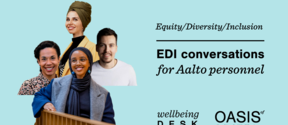Oasis of Radical Wellbeing
Social sustainability in practice.

Frank Martela, University Lecturer, Department of Industrial Engineering and Management, Aalto University
Cottage, notebook and time to think. On a couple of new years, at the end of our studies, we held small orienteering retreats. We retired to someone’s cottage and through various exercises we went through the past year and set goals for the year ahead. I was in a transition phase from studying to working life and it was time to decide what kind of working life I would be interested in. At that moment, I felt that these retreats gave me personal growth and societal impact.
Regular stopping is essential if you want to succeed in living a life of your own. When you extinguish everyday fires, the big picture is often covered in the smoke. The turn of the year or the end of the semester provides a natural point for clarifying your own life goals and checking direction.
It is especially important to check what kind of goals you are building your life on. Professor Chris Niemiec, who was working at the University of Rochester during my stay there, asked college graduates in the United States to evaluate what goals are important in their lives. Some emphasized more external goals like money and reputation, some internal goals like good relationships, personal growth, and charity.
A year later, Niemiec contacted the same guys again and asked them to assess how they now feel: Have they achieved their goals and how is it with their wellbeing?
It turned out that people had, on average, achieved more of the goals they considered valuable. That is, you get what you ask for: Those who wanted fame found fame, those who sought money felt that they had received more money than others. And those who had invested in human relationships felt their interpersonal relationships had deepened.
So, you should be careful what you wish for, because your wishes may well come true.
But in terms of wellbeing, not all goals were equal: the wellbeing of those who invested in relationships, helping others and personal growth, had improved, and for example, their anxiety had reduced once they had achieved those goals over the years.
What about those who focused on money, reputation and appearance? It turned out that although they had made progress on these goals, their wellbeing had not increased by the slightest. They were just as happy with their lives as a year earlier, when they had less money and fame. They were actually getting worse. Despite achieving goals that were important to them, they were more anxious and had more physical symptoms like headaches.
So, when you stop on vacation to think about your life goals for the coming year, don’t just think about what those goals are. Also think about why you are aiming for them. Are you looking for a job promotion with just money on your mind? Or do you experience it more as a personal development project? Do you study what you study because you want to make your parents proud? Or do you feel that the field you choose is really what you would prefer to do yourself? What about the choices you made in the past year: Are you one of those people who, in keynote speeches, remember to praise the importance of friends and family, but when making practical calendar entries, career advancement in study or work always roll over quality time with loved ones?
So do yourself a favor:
1) Take regular time to reflect on your goals for the coming year.
2) Make sure that your goals are intrinsically motivating, i.e., that they allow you to realize yourself, learn and develop, deepen your relationships, and the opportunity to do something good for other people.

Social sustainability in practice.

In monthly EDI (equity, diversity and inclusion) discussions, members of Aalto personnel gets together to discuss how to advance equity, diversity and inclusion at our work.



